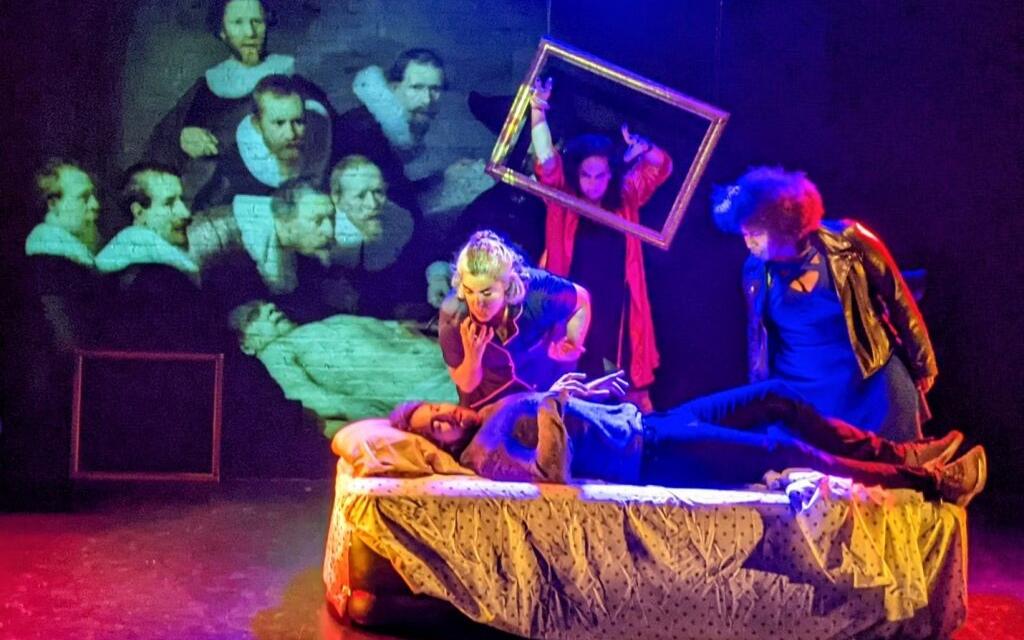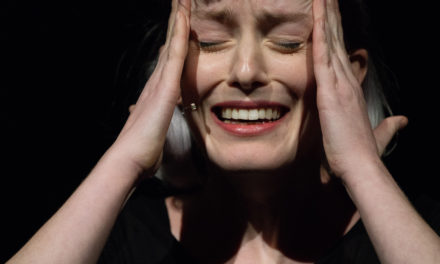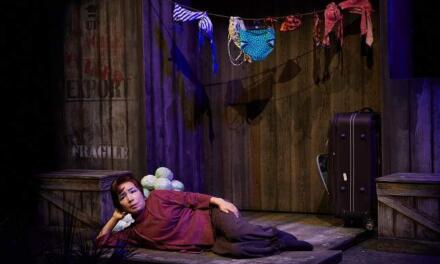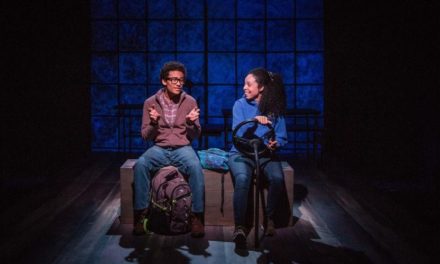In 2011, I published my first medical humanities book, Transacting Sites of the Liminal Bodily Spaces, that continued my doctoral interdisciplinary research. Soon after that, I would start working on what I thought would be my first and only play. The first draft of Mia was completed in 2011, and it was followed by revisions, more interviews, and writings that informed my interest in this highly performative, however hybrid field. It was important for me to develop a female character that faces not only a breast cancer diagnosis, has a mastectomy, but who is also pushed to challenge external and internal perceptions of femininity, motherhood, and relationships. In 2017, I was invited to present excerpts from the play during an event titled “Nothing to hide” which was hosted by RCI NYC. That was followed by a guest talk at Harvard University, “The Interplay of Ekphrastic Readings of Femininity Post-Mastectomy.” During the same year, I was awarded the Path Pace Innovation Award for “Legacies: Moving Forward.” This award allowed me to bring guest speakers to lecture to students. Two of them, breast cancer survivors, spoke about prevention, cost, the Going Flat Movement, and misconceptions related to this disease. In 2019, Handan Ozbilgin directed a staged reading of the play. We were supposed to have the play’s world premiere in 2020, but C-19 decided otherwise. In the fall of that year, though, we organized an event, “Listen to Us — Women Health: From Awareness to Action” where excerpts from the play were read, followed by a Q and A with panelists from various professions.
While waiting for a vaccine for C-19 to be released, many things started to shift within me as a playwright and scholar. I came to realize that Mia was not about breast cancer so much as it was fundamentally about thinking about our bodies and making time to discover them while raising our concerns as educated citizens. While the play’s premiere seemed to look more and more like a dream, in the summer of 2020, I had the pleasure to work with a community of international artists. Snowdrops and Chlorine, the second play about breast cancer, debuted in Zoom and it was directed by Reg Flowers.
The last part of the trilogy, and the shortest, is a total surprise for me. A few years ago, I met a molecular biology professor who incorporates dance into her breast cancer research. I was so taken by this novel approach that I wrote a script for a dance. Thus, Cancer, Choreographed was born. The dance will be a multi-sensory experience offered to the public in New York, Seattle, and Bucharest in 2023.
I started to write Mia because I knew women were struggling to accept the fluctuations of their bodies. I had no idea that I would end up writing the world’s first trilogy on breast cancer, inviting the audiences and readers to be aware of preventive ways that could save their lives, especially since this illness is not exclusively diagnosed in women, but in men, too. One day, we could all become patients. Should the role of a patient be rehearsed, even if rudimentarily? Could we enter a doctor’s office more determined to have a genuine dialogue on what hurts? Could we consciously begin our own healing?
MIA, part of Staging Breast Cancer Trilogy, had its experimental debut in November in New York. The greatest part of this experience was the sum of tears, laughs, and hugs that I shared with others, and how the vulnerability of my text made women cry and open up (I do not think the two male actors reciprocated). After the performances, whenever I had to introduce a survivor, I did that with pride and sadness. Pride because people could speak candidly, directly, and fearlessly about their respective encounters with this complex of illnesses that breast cancer is. Sadness because my mother was not in the audience. She did not make it, and years ago, I decided to write academically and creatively about cancer, wishing that I would find some comfort, hoping that I would inspire others to talk/write/perform. Developing MIA, the experiment, taught me tough lessons, such as the weirdness of having union versus non-union actors, and how a production is robbed of hours of rehearsals. There were moments when the director and I almost canceled it. We continued to work under stressful conditions in part because we were excited to finally have MIA on stage after the pandemic hiatus, in part because we knew that the topic of female health should be addressed more forcefully in public. At first, we split MIA into four parts. Then, we sutured them back into two. We were cutting MIA hastily, and every single time when we had to do that, MIA was sighing inside my body. Still, I left it there on a (post) pandemic entertainment operating table (sic!), I let MIA survive or not a brutal reality. I kept saying to myself that maybe this was fate invoking Dionysus to perform a sparagmos qua spell on my play. No wonder each time when I left home to see it, I cried. MIA became my Frankenstein and, it has just occurred to me, that that was not accidental at all. For example, the cuts in the play before bringing it to the public, the cuts invoked by Mia and Meg, i.e., the marks left on the body after mastectomy, and, of course, Mark, Mia’s spouse, a name that only came to have even more meaning once the script had been finally and carefully revised – all these cuts and marks will stay with me and make me continue my duty to invite others to join this much-needed dialogue. We can’t be healed if we do not understand the meaning of being whole. Ironically, it does not suggest (being) “in one piece,” but rather (being) in many pieces that we must care for and protect as we continue the journey through life.
ESRA DAYANI (Meg/School Inspector)
How was your experience of working on a script that talks about the female body in some quite revealing ways? Can you compare this experience with another role you played? How so?
I saw it as empowering. The human body, a woman’s body especially, is quite miraculous. Talking honestly and frankly about the body is vital. The more we discuss and/or present realistic depictions of the female body, the more we destigmatize it.
How was the experience of navigating a script written by a non-native speaker? In immigration narratives, many times we hear the derogatory reaction that “language is a barrier” that stands between people’s understanding of each other properly. When reading a script written by an immigrant, do you, as an actor, feel that, too? More, could theater dissolve these “barriers”?
As a Turkish-American woman, I grew up with one parent who was a non-native speaker of English; my mother was born and raised in Istanbul. I know first-hand how certain phrases or sayings don’t always have a direct translation and even when translated, they don’t tend to land the same way they might in the native language. Even the ways we exclaim — the sounds we make and/or associate with certain emotional reactions — can be very different from one language to the next. As an actor reading the script cold, without having the playwright there to answer questions about the intention of a line or to confirm that I’m fully understanding the way the words I’m reading are intended to land, would have been difficult. Catalina was there to clarify certain word choices; discuss options for phrasing that might land better in English, and approve small word adjustments that make the Romanian text smoother in translation. I didn’t see the language as a barrier so much as I saw it as more of a way to connect. It gave me, as an actress, a chance to say: “OK, this is what I understand this portion of the text to mean…did I get it right?” Regardless of if the answer was yes or no, it gave us a chance to dive deeper into the work; to peel back more layers, and ultimately to better understand, period, regardless of what language the piece may have originated in.
REBECCA POSNER (Mia)
How was your experience of working on a script that talks about the female body in some quite revealing ways? Can you compare this experience with another role you played? How so?
During the rehearsal process leading up to the production of this piece, I don’t think I have ever been so engaged and tapped into my own body: how it feels, what it’s trying to tell me, how it looks… It was quite refreshing and somewhat annoying, to be honest. I felt both in harmony with the realities of what my body is capable of and how it looks, but I also felt almost consumed by these thoughts, to the point where I had some moments when I had trouble feeling like I was in Mia’s body, rather than my own. As an actress being so self-aware can sometimes be an obstacle—you want to fully immerse yourself in someone else’s circumstances, limitations, and physical being, but if you’re constantly in conversation with your own body (the actress’s body) then you may have trouble letting go of your own truth and stepping into that of the character’s. In the end, though, I think I was able to strike a balance that helped me to understand the realities of Mia’s post-cancer/chemo body in a deeper way because I could feel how different it was from my own.
How was the experience of navigating a script written by a non-native speaker? In immigration narratives, many times we hear the derogatory reaction that “language is a barrier” that stands between people’s understanding of each other properly. When reading a script written by an immigrant, do you, as actors, felt that, too? More, could theater dissolve these “barriers”?
Honestly, without Catalina in the room, I do think it would have been much harder to get to the heart of the script. To believe that there are no limitations when you do not share a language is naïve. Of course, there are. What is more important, however, is analyzing the script and, if possible, sharing that process with the playwright, or at least a dramaturg who understands the culture and speaks the playwright’s language. With any play, there is a specific language that only the playwright fully understands, and if you are lucky enough to be in contact with that writer, it becomes such an advantage when getting to know and fully embody the message and story of the play. We also often have a shared physical language that can be useful when translating shows. Therefore, it is easier to tour physical theatre shows in countries that do not share the language of the piece.
SARAH SAMONTE (Stage manager)
How was working on MIA any different than any of your previous theatrical works/engagements? Could you share something from the script that spoke to you in a more personal way?
Though theater has made a comeback for both in-person and virtual performances, there has been an explosion of creativity that allows artists and creative time (during the earlier part of the pandemic) to pull out their back burner projects, their passion projects, and just create. Now that theatre is back in full swing, it’s powerful and heartwarming to be back. MIA was a different process and experience than the other shows/workshops I’ve done because of the subject matter, the intimacy of the show, and the Director of this piece. Being able to listen to the personal experiences of the actors in the show, the interviews are done by the playwright, and again such strong subject matter, helped me process life in a light I wouldn’t have otherwise. Growing up with vivacious maternal leaders, there is a lot of pride in being a woman, let alone a “healthy woman.” This show really shined on the gender roles that we all subconsciously subscribe to and attribute to. Though things are changing in the world, many conversations and taboos are being open for thought, there is so much work to be done to create a better world for the next generation.
HAO BAI (Video/Sound Designer)
How was working on MIA any different than any of your previous theatrical works/engagements? Could you share something from the script that spoke to you in a more personal way?
MIA was presented at HERE as a workshop/reading/performance format, in which the director Ozbilgin called some light and sound cues at moments in the show. They were being choreographed into the scenes. It was a fun experience. The post-show talks with survivors were really touching and made us connect to the community more. Seeing them face to face in the same room was powerful. I was talking to one of my friends after the show, and my friend shared that her mom was diagnosed with breast cancer and her grandma died from it years ago. It was vulnerable. I think the script allowed people to open up the vulnerable parts of human beings and allowed us to care more about cancer and the community, all the fear, the struggling, the cherishing, the figuring out, etc., all the emotions and daily life activities allowed us to connect more. No matter if we have had similar experiences or not, we connect as humans.
YI-CHUNG CHEN (Lighting Designer)
How was working on MIA any different than any of your previous theatrical works/engagements? Could you share something from the script that spoke to you in a more personal way?
My design approach and method of working on MIA was similar to other productions. However, the format of MIA was very different and unique. It was an installation, an experiment. There was more organic flow during the whole process which I really appreciated. A line that spoke to me was: “Meg: You don’t need to get pregnant to identify who you are. I’m not a mother. That’s fine. Not all women should become mothers.”
HANDAN OZBILGIN (Director)
A Q & A with her and the playwright after opening night can be watched here
A clip from performance here
Mia from Staging Breast Cancer Trilogy
Premiere, November 2021
HERE: Arts Center, New York City
Playwright: Dr. Catalina Florina Florescu
Director: Handan Ozbilgin
This article was originally published in Scena.ro on 8 March 2022 and has been reposted with permission. To read the original article, click here.
This post was written by the author in their personal capacity.The opinions expressed in this article are the author’s own and do not reflect the view of The Theatre Times, their staff or collaborators.
This post was written by Cătălina Florina Florescu.
The views expressed here belong to the author and do not necessarily reflect our views and opinions.


















